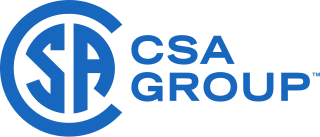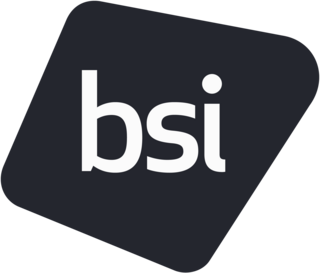Related Research Articles
Professional certification, trade certification, or professional designation, often called simply certification or qualification, is a designation earned by a person to assure qualification to perform a job or task. Not all certifications that use post-nominal letters are an acknowledgement of educational achievement, or an agency appointed to safeguard the public interest.

A forklift is a powered industrial truck used to lift and move materials over short distances. The forklift was developed in the early 20th century by various companies, including Clark, which made transmissions, and Yale & Towne Manufacturing, which made hoists.

The Health and Safety Executive (HSE) is a British public body responsible for the encouragement, regulation and enforcement of workplace health, safety and welfare. It has additionally adopted a research role into occupational risks in the United Kingdom. It is a non-departmental public body with its headquarters in Bootle, England. In Northern Ireland, these duties lie with the Health and Safety Executive for Northern Ireland. The HSE was created by the Health and Safety at Work etc. Act 1974, and has since absorbed earlier regulatory bodies such as the Factory Inspectorate and the Railway Inspectorate though the Railway Inspectorate was transferred to the Office of Rail and Road in April 2006. The HSE is sponsored by the Department for Work and Pensions. As part of its work, HSE investigates industrial accidents, small and large, including major incidents such as the explosion and fire at Buncefield in 2005. Though it formerly reported to the Health and Safety Commission, on 1 April 2008, the two bodies merged.

Professional diving is underwater diving where the divers are paid for their work. Occupational diving has a similar meaning and applications. The procedures are often regulated by legislation and codes of practice as it is an inherently hazardous occupation and the diver works as a member of a team. Due to the dangerous nature of some professional diving operations, specialized equipment such as an on-site hyperbaric chamber and diver-to-surface communication system is often required by law, and the mode of diving for some applications may be regulated.

Occupational hygiene or industrial hygiene (IH) is the anticipation, recognition, evaluation, control, and confirmation (ARECC) of protection from risks associated with exposures to hazards in, or arising from, the workplace that may result in injury, illness, impairment, or affect the well-being of workers and members of the community. These hazards or stressors are typically divided into the categories biological, chemical, physical, ergonomic and psychosocial. The risk of a health effect from a given stressor is a function of the hazard multiplied by the exposure to the individual or group. For chemicals, the hazard can be understood by the dose response profile most often based on toxicological studies or models. Occupational hygienists work closely with toxicologists (see Toxicology) for understanding chemical hazards, physicists (see Physics) for physical hazards, and physicians and microbiologists for biological hazards (see Microbiology, Tropical medicine, Infection). Environmental and occupational hygienists are considered experts in exposure science and exposure risk management. Depending on an individual's type of job, a hygienist will apply their exposure science expertise for the protection of workers, consumers and/or communities.

The CSA Group is a standards organization which develops standards in 57 areas. CSA publishes standards in print and electronic form, and provides training and advisory services. CSA is composed of representatives from industry, government, and consumer groups.

The Chartered Institute of Environmental Health (CIEH) is a professional membership body concerned with environmental health and promoting standards in the training and education of environmental health professionals.

Product certification or product qualification is the process of certifying that a certain product has passed performance tests and quality assurance tests, and meets qualification criteria stipulated in contracts, regulations, or specifications.

A roofer, roof mechanic, or roofing contractor is a tradesman who specializes in roof construction. Roofers replace, repair, and install the roofs of buildings, using a variety of materials, including shingles, single-ply, bitumen, and metal. Roofing work includes the hoisting, storage, application, and removal of roofing materials and equipment, including related insulation, sheet metal, vapor barrier work, and green technologies rooftop jobs such as vegetative roofs, rainwater harvesting systems, and photovoltaic products, such as solar shingles and solar tiles.
The Institution of Occupational Safety and Health (IOSH) is a global organisation for health and safety professionals, based in the UK.

The British Standards Institution (BSI) is the national standards body of the United Kingdom. BSI produces technical standards on a wide range of products and services and also supplies certification and standards-related services to businesses.
Right to know is a human right enshrined in law in several countries. UNESCO defines it as the right for people to "participate in an informed way in decisions that affect them, while also holding governments and others accountable". It pursues universal access to information as essential foundation of inclusive knowledge societies. It is often defined in the context of the right for people to know about their potential exposure to environmental conditions or substances that may cause illness or injury, but it can also refer more generally to freedom of information or informed consent.
Certified safety professional is a certification offered by the Board of Certified Safety Professionals. The accreditation is used in the United States by the National Commission for Certifying Agencies and internationally by the International Organization for Standardization/International Electrotechnical Commission and 193 Countries Consortium.

The National Examination Board in Occupational Safety and Health is a UK-based examination board offering qualifications in health, safety, environment and wellbeing management.
The United Kingdom Accreditation Service (UKAS) is the sole national accreditation body recognised by the British government to assess the competence of organisations that provide certification, testing, inspection and calibration services. It evaluates these conformity assessment bodies and then accredits them where they are found to meet relevant internationally specified standards.

The British Safety Council, a registered charity founded by James Tye in 1957, is one of the world's leading health and safety organisations alongside the likes of Institution of Occupational Safety and Health and International Institute of Risk & Safety Management.

ECA is the main trade association for companies involved in electrotechnical and other technical engineering projects in England, Northern Ireland and Wales. In 2022 it had some 2600 registered members - companies who collectively generated annual revenues of over £6billion. ECA also has associate categories open to industry manufacturers, distributors, educators, clients and specifiers who wish to engage and collaborate with members.

NSF is a product testing, inspection, certification organization with headquarters in Ann Arbor, Michigan. NSF also offers consulting and training services worldwide.
The Occupational Safety and Health Consultants Register (OSHCR) is a public register of UK-based occupational health and safety advice consultants, set up to assist UK employers and business owners with general advice on workplace health and safety issues. The register was established in response to the Government’s October 2010 report on 'Common Sense, Common Safety', which recommended that all health and safety consultants should be accredited to professional bodies and a web-based directory established.
The Canadian Registered Safety Professional (CRSP)/ Professionnel en sécurité agréé du Canada (PSAC) is a certification offered by the Board of Canadian Registered Safety Professionals for an Occupational Health and Safety professional. The CRSP/PSAC is accredited in Canada to ISO 17024 by the Standards Council of Canada.
References
- ↑ "About Us | BSIF" . Retrieved 2024-03-26.
- ↑ Occupational Safety & Health Consultants Register. OSHCR.
This article needs additional citations for verification .(November 2011) |